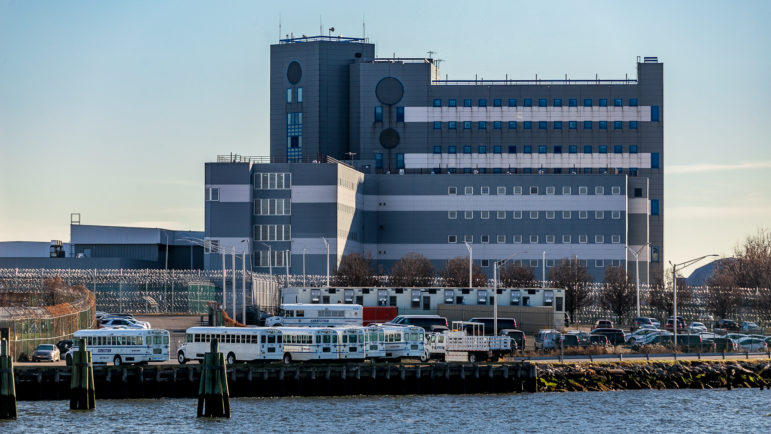Advocates have been calling for vaccine access in prisons and jails since December. A Supreme Court Judge ruled Monday that the state’s decision to expand eligibility to others in congregate settings but exclude incarcerated people was “arbitrary and capricious.”

Adi Talwar
Rikers Island.New York on Tuesday will begin offering COVID-19 vaccines to all people incarcerated in state prisons and city jails, following a court ruling Monday which found the Cuomo administration’s decision to exclude people behind bars—despite opening vaccine eligibility months ago to those in other types of congregate settings, and to correctional workers—was “arbitrary and capricious.”
A State Supreme Court judge ordered the state’s Health Department and Gov. Andrew Cuomo to “immediately authorize incarcerated individuals as a group for vaccination,” saying that excluding those in correctional custody violated the 14th Amendment’s Equal Protection Clause. The ruling was in response to a lawsuit filed by advocates and public defenders who have been calling for months for the state to prioritize vaccine access in jails and prisons, citing the extra risks for COVID-19 exposure. Those in correctional facilities, the lawsuit argued, are forced to sleep, eat and shower in close proximity to others, making social distancing impossible.
Since the start of the pandemic, 35 people in state prisons and three people incarcerated in the city’s jail system have died from COVID-19. The state’s Department of Corrections and Community Supervision (DOCCS) started vaccinating individuals 65 and older in its custody on Feb. 5, more than three weeks after that age group became eligible under state rules. The city’s Department of Correction (DOC) , which oversees city jails, has been pushing the state to expand edibility to everyone in its custody.
Beth Garvey, acting counsel for Gov. Cuomo, said the state will expand eligibility for all incarcerated people on Tuesday — the same day New York began offering vaccines to all residents 30 years and older.
“Our goal all along has been to implement a vaccination program that is fair and equitable, and these changes will help ensure that continues to happen,” Garvey said in a statement. DOCCS had administered 19,246 vaccine doses as of March 27, according to the state, though officials did not specify how many of those doses went to its staff and how many to those in custody.
Justice advocates cheered Monday’s court ruling, but blasted the Cuomo administration for taking so long to make the change, which they say is an equity issue since Black and Latino residents are disproportionately represented in New York’s prisons and jails.
“It is appalling and unconscionable that this took a court ruling, as thousands of incarcerated New Yorkers have tested positive for COVID-19 and dozens have died,” Robin DelPiore, a community leader with the advocacy group Center for Community Alternatives, said in statement.
Advocates are calling for the city and state to do more to reduce the number of New Yorkers behind bars, including passing state bills that would reform the state’s parole system, particularly for older incarcerated people. There were 32,384 people in custody in state prisons in March, according to DOCCS numbers — down from 44,334 from 2019.
As of March 19, 5,690 people were being held in city jails, surpassing pre-pandemic numbers and up from a low of 3,809 in April 2020, when advocates were pressuring the city to release more people in response to COVID-19 risks.
Justice advocacy groups are also pushing Gov. Cuomo to immediately enact the HALT Solitary Confinement Act, which would greatly limit the use of “administrative segregation,” in state prisons, banning isolation for more than 15 days. State lawmakers passed the bill earlier this month, but Cuomo has yet to sign it.









